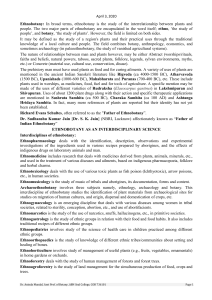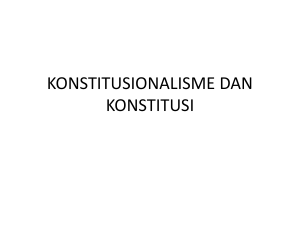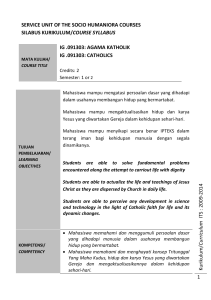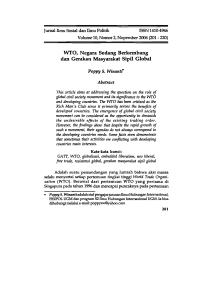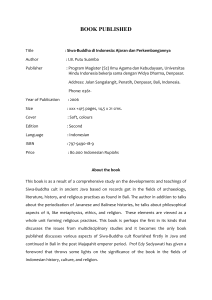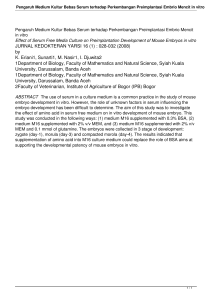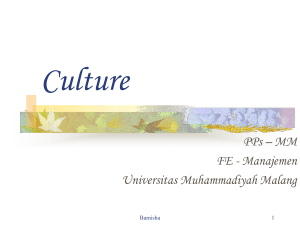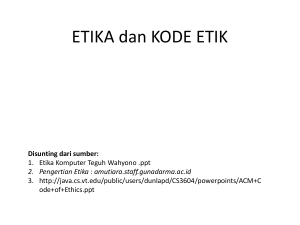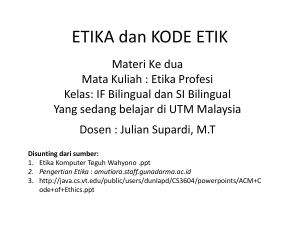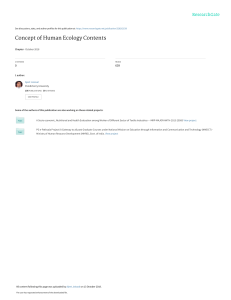Medical Anthropology
advertisement
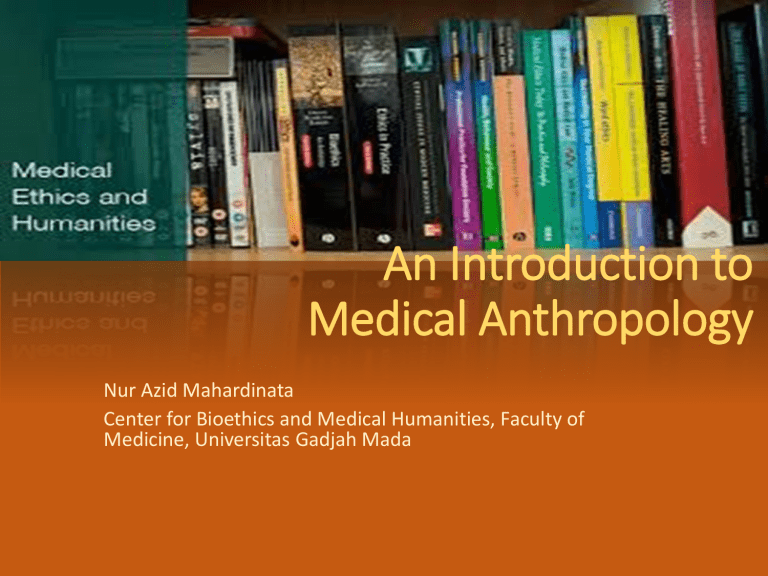
An Introduction to Medical Anthropology Nur Azid Mahardinata Center for Bioethics and Medical Humanities, Faculty of Medicine, Universitas Gadjah Mada Learning Objectives At the end of this lecture, students should: • Gained an insight into the main concept of cultural anthropology • Understand the general objectives and approaches of medical anthropology • Be able to explain the differences of anthropological approach and natural science approach • Discuss the implementation of medical anthropology in health research Perkembangan Ilmu Antropologi Fase I (<1800an) • Ethnography (deskripsi bangsa-bangsa) nonEropa • Munculnya gagasan-gagasan mengenai bangsabangsa non-Eropa (Afrika, Asia, Oceania, dan Indian): • Bangsa lain adalah manusia liar keturunan iblis (savage, primitif) • Bangsa lain adalah bangsa yang murni atau contoh masyarakat yang belum mengenal kejahatan • Keanehan bangsa-bangsa lain tersebut adalah sebagai objek museum Perkembangan Ilmu Antropologi Fase II (Medio abad 19) • Penggolongan bangsa-bangsa di dunia dari masyarakat dan budaya yang paling tinggi (eropa barat) hingga yang paling rendah • Muncul karangan-2 atau tulisan ilmiah yang mengklasifikasikan bahan-bahan mengenai berbagai kebudayaan di dunia dalam berbagai tingkat evolusi (lahirlah istilah antropologi) • Lebih bersifat akademis • Mempelajari masyarakat dan kebudayaan primitif dengan maksud mendapatkan pengertian mengenai tingkatan-tingkatan dalam sejarah evolusi dan sejarah penyebaran kebudayaan manusia di muka bumi Perkembangan Ilmu Antropologi Fase III (awal abad 20) • Berkembang sebagai ilmu praktis, untuk mempelajari masyarakat dan kebudayaan suku-suku bangsa di luar Eropa guna kepentingan pemerintah kolonial dan guna mendapat pengertian tentang masyarakat modern yang bersifat kompleks Fase IV (>1930an) • Antropologi gaya baru, dengan 2 tujuan: • Akademis: mencapai pengertian makhluk manusia pada umumnya dengan mempelajari berbagai bentuk fisiknya, masyarakatnya, maupun kebudayaannya • Praktis: mempelajari manusia dalam beragam masyarakat suku bangsa guna membangun masyarakat suku bangsa tersebut Masalah-masalah Penelitian dalam Antropologi 1. Masalah sejarah asal dan perkembangan manusia (atau evolusinya) dipandang dari segi biologi 2. Masalah sejarah terjadinya berbagai ragam manusia, dipandang dari ciri-ciri tubuhnya 3. Masalah sejarah asal, perkembangan, serta penyebaran berbagai macam bahasa diseluruh dunia 4. Masalah perkembangan, penyebaran, dan terjadinya beragam kebudayaan di dunia 5. Masalah mengenai asas-asas kebudayaan manusia dalam kehidupan masyarakat-2 suku bangsa di dunia Ilmu-ilmu Bagian Antropologi • Antropologi biologi/fisik • Paleoantropologi • Antropologi fisik • Antropologi budaya/sosial • Prehistorik • Etnolinguistik • Etnologi • Etnopsikologi • Antropologi spesialisasi (ekonomi, politik, kesehatan, kependudukan, pendidikan, perkotaan, hukum, dll) • Antropologi terapan What is culture? Known definitions of culture: • System of meaning – belief, knowledge and action– by which people organize their lives • That complex whole; which includes knowledge, belief, art, morals, law, custom, and any other capabilities and habits acquired by man as a member of society • The man-made of the environment What is culture? (cont’d) • Culture comprise systems of ideas, concepts, rules, and meanings that underlie and are expressed in the ways that human live • Anthropologists are not only interested in ideas, beliefs, and meanings, but also in what people do, as actual practices often reflect beliefs Medical Anthropology By Deffinition: • The study of medical phenomena as culture (Hardon, 1995) • Medical systems emerge from human attempts to survive disease and surmount death, and from social responses to illness and the sick role. Medical anthropology is the descriptions and analysis of this process within the variety of the world cultures (Ross, Moerman, and Tancredi, 1991) • Systematic inquiries by anthropologist into health practices and explanations of disease across culture • Medical anthropology belongs to the domain of cultural anthropology and has distinctly research approach from biomedical sciences Types of medical anthropology • Anthropology in medicine the work of anthropologists carried out in close collaboration with medical professionals, making their data available to doctors in order to improve the quality of medical services • Explaining the ideas of illness of patients to doctors contribute to better communication between doctors and patients • Anthropology of medicine take a distance from medical practice and study it as a social and cultural phenomena • Criticism of the term compliance for being doctor centered Approaches in Medical Anthropology Contextualization • Study subjects within context object of research is broadened by the inclusion of its relevant context to understand the meaning of people ideas and practices • This is different with other sciences (i.e. natural science) that “explain” their object by reducing it to some basic principles • Biology study the quality of water by taking one drop and placing it under microscope, looking for microbes • Anthropology studies how people use water in everyday life, who collects and uses it, for what purpose Emic and Etic Approaches • On understanding and studying culture in context, anthropological research focusing on the two approach: • The Emic approach how people view their own situation and how they solve their problems • The Etic approach based on ideas of what outsiders, policy makers, and health workers have about a particular group • As an example: beliefs about the causes of diarrhea (people ignorance vs. indigenous knowledge) Cultural relativism • Cultural relativism: cultures -- and so of ideas and practices, are diverse and unique, they can only be understood in terms of their own standards and values • It is clear that one cannot speak in universal terms, or using his/her own cultural background to view other people and ways of life (ethnocentrism) • A trained doctor may think that consult an oracle to find out who caused a disease is useless and senseless, while his patient may be puzzled why the doctor is not paying attention to the deeper and underlying causes of the disease Theoretical Perspectives Structural Functionalism • Social and cultural phenomena are seen as functionally interconnected and basic to the structural maintenance of society • The task of anthropologist is to show how the different elements interact to make society into what it is (its structural maintenance, harmony, equilibrium) • Illness is a dysfunction of the body and health care is contribute to the maintenance of society as a whole by “repairing” the sick individual Ecological perspectives • Culture is human adaptation to environment because cultural phenomena are seen as human solutions to problems posed by the natural environment • Health is regarded as the result of successful adaptations to environmental challenge and disease is the outcome of the failure to adapt • The spread of malaria clearing the forest and agricultural way of life Marxist political economy • Culture is mainly the outcome of political and economic circumstances • Health – or the lack of it, and the quality of health are determined by social competition between groups of people and the unequal distribution of scarce resources • The sale of pharmaceuticals in developing countries primary objective is the accumulation of capital, not disease prevention or alleviation. Profit motive explains why some essential drugs are extremely scarce in particular society Cognitive and symbolic approach Seeing the cognitive and symbolic aspects of culture (emic approach) • how do people see illness • how do they choose various curative alternatives • How do they communicate with health practitioners Related Concept and research Method in medical anthropology Related concepts in Med-Anthro. • Analytical distinction between disease, illness, and sickness • disease is the definition of health problem by medical expert, • illness refers to the experience of the problems by the patient, and • sickness is the social role attached to a health problems by society at large • Medicalization the label of socially unacceptable behavior as disease Related concepts (cont’d) • Explanatory models explanations for the origins of a condition and its treatment, by patients and practitioners • Classification of theories of illness causation: • Personalistic systems: illness is due to the purposeful intervention of an agent, either supernatural or human • Naturalistic systems: illness is explained in impersonal, systematic terms can be caused by natural forces or imbalance within individuals Research Methods in Anthropology • Qualitative approach in nature • Participant observation: observing the practices and experiences of the people by living for an extended period among the group being studied, share experiences, participate in daily events in order to be able to describe customs and beliefs “from within” • In-depth interview: involves day-to-day conversation that allows longer questions and probing (interviewer can go back and review points that are not clear, informant is more spontaneous in her or his responses) Suggested Readings Available at Center for Bioethics • Edel and Edel, 2000. Anthropology and Ethics: the Quest for Moral Understanding. New Jersey: Transaction Publishers. • Johnson and Sargent, 1990. Medical Anthropology: Contemporary Theory and Method. • Gingrich and Fox, 2002. Anthropology, By Comparison. London: Routledge
